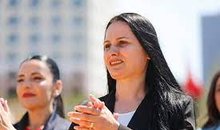
 Flash News
Flash News
Ceno Klosi with over 800 stolen votes, Balluku finds the reason is the tiredness of the counters
"Fast & Furious" in the former Block, police chase an Audi Q8, 4 cars collide
Car hits two tourists on a motorcycle in Fushe Arrëz, one of them dies
Serious accident in Thumanë, one dead, 3 injured
Durrës Court suspends the director of Pre-University Education from duty
VOA: Holta Zaçaj attempted to postpone his mandate in the 'Constitutional Court', the Supreme Court declares the vacancy

In Albania, the Supreme Court announced today the opening of the procedure for the election by the Supreme Court of a new member of the Constitutional Court with a full 9-year mandate, who should replace the current president of this court, Holta Zaçaj. The Supreme Court's decision comes a day after Ms. Zaçaj publicly announced that her mandate would not end on March 10, 2025. Official communications reveal that Ms. Zaçaj was fully aware that her mandate officially ends on March 10 of next year, in contrast to her public stance. At least two announcements by the Supreme Court in 2021 and 2022 announcing the vacancy clearly defined the deadline. Ms. Zaçaj herself, in her application for candidacy, also refers to March 2025 as the end of the mandate for which she was running.
Ms. Zaçaj was appointed as a member of the Constitutional Court in January 2023, succeeding Judge Vitore Tusha, whose mandate had ended on March 10, 2017. Her appointment was included in the scheme provided for in the transitional provisions of the Constitution, also reflected in the Law on the Organization of the Constitutional Court, which guaranteed the renewal of the Court every three years, with three members.
Precisely for the implementation of the renewal cycle, the subsequent mandate of Ms. Vitore Tusha was limited to 8 years, so that together with the subsequent mandates of former members Sokol Berberi and Vladimi Kristo (ended in 2016), a group of three members would be created, one for each appointing body, to be replaced in 2025. "Such a solution confirmed the renewal of the Constitutional Court as a constitutional obligation that prevails over the 9-year duration of the judge's mandate," the High Court underlines, in today's announcement of the vacancy, signed by its president Sokol Sadushi.
Ms. Zaçaj made an unexpected move yesterday, ignoring the legal framework under which she was elected, interpreting herself as ending her mandate, not on March 10, 2025, but “based on the general legal rules for calculating terms, the end of the term of office should be considered the end of 2025”. Although she does not refer to any legal basis for this calculation, as an argument for not recognizing March 10, 2025, she mentioned the fact that according to her “neither the constitutional provision, nor consequently the decision of the Supreme Court for the election of the constitutional judge, has a set date for the end of this duty”.
But the truth seems to be completely different. Today's announcement by the Supreme Court reveals that this court, when it has twice announced the vacancy for the subsequent mandate of Ms. Tusha, has also determined the time of completion. "In the announcement of the Supreme Court dated 3.06.2021, it was determined that the announcement of vacancies for members of the Constitutional Court is made as follows: "1. In the vacancy that arises after the departure of Ms. Vitore Tusha (the full 9-year mandate ended in 2017), a new judge is elected, who will remain in office until March 2025". Due to the limited number of applicants, even in the announcement dated 31.01.2022 made by the Supreme Court for filling the vacancy after the departure of Ms. Vitore Tusha, it is expressly stated: "...The President of the Supreme Court re-announces the call for filling the vacancy created by the end of the term of the judge of the Constitutional Court, for the remainder of the 9-year term, which ends in March 2025", announces today's communication from the Supreme Court.
Moreover, according to official documents, "Ms. Holta Zaçaj herself, in the two requests for application review, which she addressed to the High Court and the Judicial Appointments Council, on 25.02.2022 and 30.11.2022, has expressed her willingness to be elected to the "remaining term of the 9 (nine) year term, which ends in March 2025 of Ms. Vitore Tusha", specifies the High Court.
These facts further aggravate the position of the President of the Constitutional Court, as it turns out that she has provided false information to the public, and even based on them she has addressed the Venice Commission, without first consulting the body of members of the Court. On the other hand, by using unfounded information as arguments, Ms. Zaçaj has bypassed the constitution and the law itself, by not declaring the end of her mandate, thus creating an artificial crisis and an unnecessary clash with the Supreme Court.
The latter has assessed that while “the Constitutional Court has not fulfilled either the obligation to declare the end of Ms. Holta Zaçaj's mandate, or the notification by the President of the Constitutional Court of the end of the judge's mandate..” the Supreme Court itself “as the appointing body is charged by Article 125, point 1 of the Constitution to exercise its exclusive competence to elect the member of the Constitutional Court, without being hindered by any other constitutional body”.
The Supreme Court notes that "the failure of the Constitutional Court by its President to announce, no later than 10.12.2024, the end of the mandate of Ms. Holta Zaçaj, cannot prevent or avoid the exercise by the Supreme Court and the Judicial Appointments Council of the constitutional competence to elect a new member of the Constitutional Court." According to the President of the High Court, Mr. Sadushi, "the announcement of the end of the term of office of a judge of the Constitutional Court by its president as a formal act serves to declare a vacancy, clearly defined throughout the procedure followed by the High Court, as an appointing body, and does not have any consequence on the validity of the procedure carried out for this purpose" and that otherwise "the failure to fulfill the legal obligation by the President of the High Court to open the procedures for accepting applications for candidacies for members of the Constitutional Court would prevent the Judicial Appointments Council from starting the procedure for verifying and ranking candidates, as well as in particular the High Court from exercising its constitutional power to fill the next vacancy in the Constitutional Court".
Latest news





Lufta në Gaza/ Pse Netanyahu do vetëm një armëpushim 60-ditor, jo të përhershëm?
2025-07-02 21:56:08
US suspends some military aid to Ukraine
2025-07-02 21:40:55



Methadone shortage, users return to heroin: We steal to buy it
2025-07-02 20:57:35
Government enters oil market, Rama: New price for consumers
2025-07-02 20:43:30
WHO calls for 50% price hike for tobacco, alcohol and sugary drinks
2025-07-02 20:41:53







Israel agrees to 60-day ceasefire in Gaza, but many unanswered questions remain
2025-07-02 18:35:27
The weather in Germany is going "crazy", temperatures reach 40°C
2025-07-02 18:22:21

"Fast & Furious" in the former Block, police chase an Audi Q8, 4 cars collide
2025-07-02 17:59:25
"Birth on a tourist visa? US Embassy warns Albanians: This is prohibited!"
2025-07-02 17:48:16


BIRN: Fier recount reveals vote trafficking within open political party lists
2025-07-02 16:57:19

CEO and former director of 'Bankers Petroleum' arrested in Fier
2025-07-02 16:40:42
Car hits two tourists on a motorcycle in Fushe Arrëz, one of them dies
2025-07-02 16:33:23



Fire at the Elbasan Incinerator Landfill, Prosecution Launches Investigations
2025-07-02 15:34:54
What you need to know if you travel to a country with active volcanoes
2025-07-02 15:33:03



EU proposes 90% reduction in greenhouse gases by 2040
2025-07-02 14:50:23
Europe is burning from the heat / Italy and France are on maximum alert
2025-07-02 14:36:52

Moscow's contradictory statements: Is the friendship with Vučić breaking down?
2025-07-02 14:21:05
'I lost my battle': Sea warming is killing fishing in Albania
2025-07-02 14:08:35
Sekretet kimike që ndihmojnë në mbajtjen e mjaltit të freskët për kaq gjatë
2025-07-02 14:01:26

Denmark makes historic decision to make military service mandatory for women
2025-07-02 13:44:33
The appeal of the GJKKO leaves former judge Pajtime Fetahu in prison
2025-07-02 13:30:20
Productivity losses could reduce GDP by 1.3% as a result of extreme heat
2025-07-02 13:21:04
He abused his minor daughter, Zamir Meta is left in prison
2025-07-02 13:04:04

Waste burning in Elbasan, Alizoti: They are poisoning people and stealing money
2025-07-02 12:48:39
Civil disobedience continues in Serbia, dozens of people detained
2025-07-02 12:40:32
Rama's government was born under the sign of garbage and will end like this
2025-07-02 12:28:09
Water prices increase in the municipalities of the Elbasan region
2025-07-02 12:13:38
Civil disobedience continues in Serbia, what is happening in Belgrade?
2025-07-02 12:07:44
Serious accident in Thumanë, one dead, 3 injured
2025-07-02 11:54:42
Durrës Court suspends the director of Pre-University Education from duty
2025-07-02 11:49:27
Plenary session on Thursday, what is expected to be discussed
2025-07-02 11:36:43
Europe is burning from heat waves/ What is the 'thermal dome' phenomenon?
2025-07-02 11:26:25
Wanted by Italy for murder, 45-year-old arrested in Vlora
2025-07-02 11:19:31
Fire situation, 28 fires reported in 24 hours, 2 still active
2025-07-02 11:13:20
"Buka" file, preliminary hearing for Ahmetaj postponed to July 17
2025-07-02 11:03:30


Baçi: Belinda Balluku and Ceno Klosi, the most dangerous "gangs" in Fier
2025-07-02 10:32:09
Zamir Meta, suspected of sexually abusing his daughter, arrives in court
2025-07-02 10:21:33

Trump: Israel has agreed to a 60-day ceasefire in Gaza
2025-07-02 10:01:55
Fire continues at Elbasan landfill
2025-07-02 09:51:13

Dates to note during July, important events will occur
2025-07-02 09:31:45
The hearing for Jorgo Goro's claim is postponed
2025-07-02 09:24:19



Foreign exchange, the rate at which foreign currencies are sold and bought
2025-07-02 08:42:31

52% of pensioners did not receive full pension in 2024
2025-07-02 08:27:18
Horoscope, what do the stars have in store for you today?
2025-07-02 08:13:36
Hot weather, Wednesday brings high temperatures
2025-07-02 07:59:16
Morning Post/ In 2 lines: What mattered yesterday in Albania
2025-07-02 07:46:15
Heatwave sweeps across Europe, Spain and England record hottest June ever
2025-07-01 22:57:41






Golem and Qerret without water at the peak of the tourist season
2025-07-01 21:09:32

Euractiv: Italy-Albania migrant deal faces biggest legal challenge yet
2025-07-01 20:53:38
BIRN: Brataj and Fevziu victims of a 'deepfake' on Facebook
2025-07-01 20:44:00

Vlora by-pass, work delays and cost increases
2025-07-01 20:24:29



Milan are expected to give up on the transfer of Granit Xhaka
2025-07-01 19:41:25

